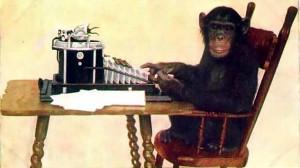An infinite number of monkeys, typing randomly on typewriters, will produce the complete works of Shakespeare – the Infinite Monkey Theorem
Part of speculation, and trading in general, is coming to terms with uncertainty. Sometimes your trades work. Sometimes they don’t. If you think you know ahead of time which way the next trade is going to go, well, you’re wrong. You don’t know. You may have some evidence, a probabilistic understanding, but you don’t know. This uncertainty will never change – it’s true the first trade you take, and it’ll be true when you’re poring over the Bund yield curve in your nursing home and complaining that you can’t taste the pudding anymore.
If you’re going to encounter rampant uncertainty your entire career, it only makes sense to have tools for dealing with it. Thankfully, mathematics has provided us with two such tools: statistics for studying the sources of uncertainty, and probability for making predictions about an uncertain future. From a trader’s perspective these are certainly the guiding lights of mathematics. But by themselves they are not enough. More important is adopting a certain way of looking at the world, a view that puts uncertainty, rather than cause and effect, at the center of affairs. It’s related to the philosophical notion of indeterminism, an idea so far out of the public conscience it’s not even in my browser’s dictionary. In the gambling literature, the same idea appears under the tagline of “play expectations, not results”. But for the purposes of trading, I suggest calling it “monkey thinking”. I’ll explain why in a bit.
The problem with reasoning about uncertain outcomes is that much about them is hidden. Consider a macabre game in which the contestant plays Russian roulette with a six chamber revolver. One time in six, he dies. The other five times, whoever’s running the game offers to pay the winner $100. Playing is purely optional. Now imagine someone takes this offer, wins, and pockets his $100. From a pure accounting perspective, we would say the contestant has profited by $100. But I claim, and I hope most people can see, that he has not in fact profited in a philosophical sense. The IRS may tax him $27 or whatever, but playing this game is harmful rather than beneficial. That said you could imagine, were these events to actually occur, that it might be difficult to convince the winning contestant of his folly. He has a completely tangible $100 to point to as a means of bolstering his case. You have only arguments about things which did not occur. Events have proven him right. How do you argue with such a man?
I would propose the following: replace the contestant with a large number of monkeys.
 Each monkey takes the same actions the contestant would take. The monkeys then experience all uncertain events in the proportions you would expect. So 1/6th of the monkeys end up dead and the other 5/6ths end up $100 richer. Now it’s easy to argue against playing – you can simply point to the monkey corpses everywhere to show why Russian roulette is a bad idea even if you get paid when you don’t die.
Each monkey takes the same actions the contestant would take. The monkeys then experience all uncertain events in the proportions you would expect. So 1/6th of the monkeys end up dead and the other 5/6ths end up $100 richer. Now it’s easy to argue against playing – you can simply point to the monkey corpses everywhere to show why Russian roulette is a bad idea even if you get paid when you don’t die.
For those who are concerned about the poor monkeys getting shot, I share your concerns but that’s the price of science. I might also remind you that in Borel’s original formulation some unlucky monkeys were stuck endlessly churning out Jersey Shore scripts for all eternity. There are fates worse than death.
Monkey thinking is surprisingly powerful. By replacing one “you” with a large number of individuals all making the same decisions, and then subjecting the whole group to the random outcomes resulting from those decisions, the true nature of the results are more clearly visible than they are in real life. Because this visibility is so essential to reasoning about uncertainty, I’m going to come back to the monkeys repeatedly in this blog. For now though I want to use them to explore one fairly simple idea: what makes a decision good in the face of randomness?
When making decisions in an uncertain environment, we don’t get to choose our outcomes. You can’t choose to make only winning trades. What you can do is choose to expose yourself to randomness with certain likelihoods of various outcomes. You can take trades that win a dollar more often than they lose a dollar. You can take trades where most of the monkeys come out ahead. However, as the roulette example illustrated, this is not sufficient. Five of six monkeys are ahead – the median monkey is turning a profit. It’s that one dead monkey which is the problem. So optimization is really a two step process:
- maximize the result for the median monkey
- eliminate or minimize outcomes far worse than the median – in other words, try to pull the worst outcomes up towards the middle.
This really is the goal of a speculator, just put in monkey form. Translated to more conventional terminology you want to make bets that mostly benefit you, and that don’t have any excessively bad outcomes. What we’ll see as we apply these two goals to practical scenarios is that they are frequently in conflict and trade offs have to be made. The monkeys will be a key tool in reasoning about those trade offs.